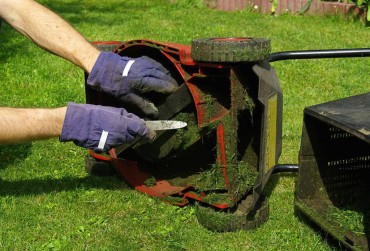 With spring officially here, winter-weary homeowners are eager to spend time outside in their yards. The Outdoor Power Equipment Institute (OPEI), an international trade association representing more than 100 power equipment, engine and utility vehicle manufacturers and suppliers, reminds homeowners to keep safety in mind.
With spring officially here, winter-weary homeowners are eager to spend time outside in their yards. The Outdoor Power Equipment Institute (OPEI), an international trade association representing more than 100 power equipment, engine and utility vehicle manufacturers and suppliers, reminds homeowners to keep safety in mind.
“You want your outdoor power equipment to be ready when you need it,” said Kris Kiser, president and CEO. “Doing some basic maintenance now will ensure that your equipment operates safely and helps get the job done.”
Before you use a mower, trimmer, blower, chainsaw or pruner this season, OPEI reminds you to inspect your equipment, review equipment manuals and look over safety procedures. Here are tips to help:
- Start with the owner’s manual. Review the manufacturer’s guidelines on equipment operation and requirements. Refamiliarize yourself with the equipment’s operation and safe handling.
- Inspect equipment. Check for loose belts and missing or damaged parts. Examine all cables, brakes and wheels for signs of wear and damage. Make sure no safety features or guards have been disabled or removed. If you find anything concerning, replace the parts or take your equipment to a qualified service representative.
- Replace old oil. Run the engine for a few minutes to warm up existing oil so it will drain more easily. Stop the engine, remove the drain plug and empty the old oil (tilt the mower back to get it all out, if necessary). Replace the plug and refill the engine with oil recommended by the product manufacturer. Properly dispose of the drained oil.
- Check the fuel tank. Fuel left in the tank over the winter months should be drained, or it could damage your equipment. Most fuel contains some level of ethanol, which contains corrosive alcohol and can phase separate.
Drain the tank responsibly and put in fresh fuel that contains 10 percent or less ethanol (E10 or less). Dispose of old fuel properly. Some gas stations may offer E15 or other fuel blends, but this higher-ethanol fuel is dangerous — and is in fact illegal — to use in any small-engine equipment such as lawnmowers, chainsaws, generators and other lawn and garden equipment.
- Store fuel properly. Label fuel storage cans with the purchase date of fuel. Never leave fuel that is more than 30 days old in outdoor power equipment.
- Check the undercarriage. Always disconnect the spark plug before working around the underside of a mower. Use a wire brush to scrape any old grass clippings or dirt away.
- Clean the equipment. Dirt, oil and grass can stick so give everything a good cleaning so the machine can run more efficiently and last longer.
- Install clean air filters. Engines and equipment run much better with clean filters. Paper filters need to be replaced. Some foam filters can be cleaned and used again.
- Change the spark plug if needed. See your owners manual.
- Sharpen your cutting blade. Have lawnmower cutting blades sharpened so you can get a clean cut on your lawn and not tear the grass. Sharper blades mean lawns will be healthier and lawn mowers will operate more efficiently. Nicked or broken blades, which can come from hitting rocks or other debris, should be replaced.
For more safety tips, go to www.opei.org. For further information on proper fueling, go to www.LookBeforeYouPump.com.








